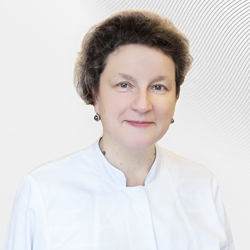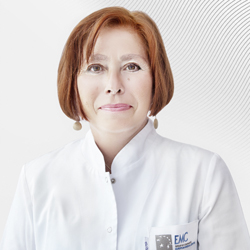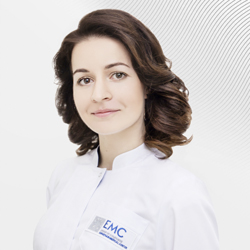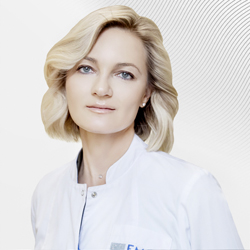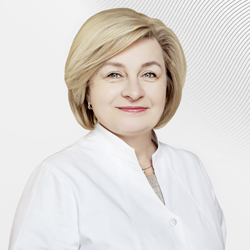
Internal Medicine Clinic
Gastroenterology
Specialists in the Department of Gastroenterology provide diagnosis and treatment for diseases of digestive system organs: the esophagus, stomach, duodenum and other parts of the small and large intestines, liver, pancreas, gallbladder and biliary tract.
Priority areas include hepatology (the diagnosis and treatment of viral hepatitis B, B + D, C) and enterology (treatment of inflammatory bowel diseases). Department specializations include the treatment of ulcerative colitis or Crohn's disease using modern effective treatments, such as: biological therapy, triple therapy for hepatitis and hepatitis treatments without interferon.
The department uses study techniques which allow the diagnosis to quickly be established or confirmed, in accordance with Russian and international standards of diagnostics. High-tech studies are used including capsule endoscopy, CT colonography (virtual colonoscopy), MRI enterography, blood tests to diagnose the liver's condition and functioning, genotyping of the hepatitis B and C viruses, and genetic studies.
- We treat using modern medications whose efficacy has been confirmed by international clinical studies.
- Specialists in the department work in close collaboration with physicians from other specialties:
- Endocrinology (treatment of hormonal disorders, obesity and metabolic syndrome);
- Surgery (treatment of diseases of the gallbladder, liver and pancreas);
- Proctology (treatment of inflammatory bowel disease and hemorrhoids);
- Dermatology and gynecology (treatment of skin problems);
- Ears, nose and throat (treatment of gastroesophageal reflux);
- Psychology and psychotherapy (treatment of psychosomatic illnesses).
- Most digestive diseases have similar symptoms.
- A gastroenterology consult is appropriate if you have:
- Heartburn or belching;
- Nausea, sore throat or difficulty swallowing food;
- An unpleasant taste in the mouth;
- Pain or discomfort in the abdomen;
- Stomach pain;
- Pain in the liver;
- Flatulence;
- Bloating;
- Heaviness or fullness in the abdomen;
- Diarrhea or loose stools;
- Constipation.
- Metabolic analysis of the blood (hepatic and lipid profiles) over the course of the day;
- Markers of viral hepatitis A, B, C and D;
- Tumor markers; alpha-fetoprotein;
- Genetic markers for hereditary diseases;
- Ultrasound of the hepatobiliary system;
- Endoscopic studies of the gastrointestinal tract;
- Profile of thyroid hormones;
- An extended range of laboratory (cytological, immunological, biochemical and hormonal) studies;
- CT of the abdominal organs;
- Noninvasive diagnosis of liver diseases using FibroTest/FibroMax.
- Early diagnosis and the use of effective treatment methods in accordance with international standards can quickly bring successful results.
TREATMENT OF LIVER DISEASES
This is one the department's priorities.
The Hepatology Center operates at EMC, where patients with various liver diseases receive comprehensive, specialized, consultative, medical, diagnostic and therapeutic services at all disease stages. Some of the technology used in the Center is unique to Russia, although has been shown to be highly effective in international evidence-based medicine.
The Hepatology Center at EMC specializes in the treatment of autoimmune and drug-induced hepatitis, hemochromatosis overlap syndrome, alcoholic liver disease, non-alcoholic fatty liver disease and chronic viral hepatitis B, C, D and E.
Modern technologies of genetic analysis help to optimize treatment and eliminate or minimize the side effects of drug therapy.
Specialists at EMC's Hepatology Center conduct a wide range of laboratory and instrumental studies in order to diagnose various liver diseases and to study the liver's functional and anatomical characteristics. These are studies such as:
Prices
| Name | Price, € | Price, ₽ | Code |
OUTPATIENT SERVICES > CONSULTATIONS > Specialist's consultation
| Gastroenterologist consultation | 220 € | 21 683 ₽ | CS34 |
Laboratory services
| Gastro panel (pepsinogen I, pepsines Helicobacter pyloriogen II, gastrin 17 (basal), IgG antibodi) | 100 € | 9 856 ₽ | C146 |
DOCTOR'S SERVICES AND PROCEDURES > Level А
| Respiratory near-patient testing for Helicobacter pylori | 64 € | 6 308 ₽ | PRCD86 |
EMC Schepkina
35, ul. Schepkina, Moscow, 129090
Yandex.Maps
Yandex.Maps
Парковка № 3105 платная, пн-вс, кроме праздников, с 8:00 до 21:00: 380 руб/час, с 21:00 до 8:00: 200 руб/час.
Work hours: 24/7
Phone:
+7 (495) 933-66-55

Represented specialties
